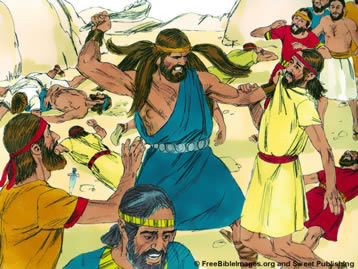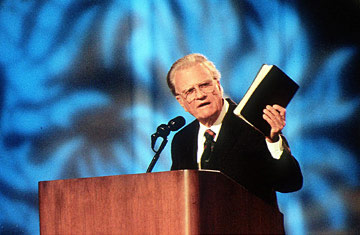Confidence in God's Means

by Dennis Pollock
It is one of the more peculiar ways of God that He almost always uses means to accomplish His ends. Of course using means to achieve ends is something we do all the time, but somehow we suppose that the Creator of the universe would not find this necessary. God would simply will things to be done and that would be that. And certainly God could do things that way, but in fact He rarely seems to prefer it. Far more often than not, when the Almighty chooses to move and work among His creation here on this earth, He chooses to do it through men and women, and He gives them methods, tools, gifts, styles, talents, instruments, and other means by which His will is brought to pass.
One of the most obvious examples of this is Moses, Israel's great liberator. When God appeared to eighty-year-old Moses in the burning bush and sent him to Egypt to bring the people of Israel out of their Egyptian bondage, He announced that the job would not be easy. Pharaoh would be totally unwilling to lose millions of slaves, and would prove a most stubborn monarch. For this reason God promised Moses that He would strike Egypt with all sorts of miraculous wonders. Moses would be at the forefront of all of this, and serve as God's spokesman to proud, stubborn Pharaoh. But he would need a tool to get the job done. No, it would not be a great sword, or a powerful bow, or a spear. It would be… a stick! That's right, Moses would use a large stick, otherwise known as a rod, to serve as God's means to liberate millions of slaves. God told Moses: "And you shall take this rod in your hand, with which you shall do the signs" (Exodus 4:17). When it was time to leave for Egypt, the Bible tells us:
Then Moses took his wife and his sons and set them on a donkey, and he returned to the land of Egypt. And Moses took the rod of God in his hand. (Exodus 4:20)
Anyone watching Moses on his way to Egypt would have hardly given the rod a second look. It had no special properties that were visible to the eye. It was a common shepherd's rod, which did double duty as a walking stick. It did not glow or dazzle the eye. Had you touched it, it would have felt exactly like what it was – a rod made of wood. And yet amazingly, when it was time to do those awesome and fearful miracles which shook the mightiest nation on the earth to its core, the rod was always present. Whether turning the Nile River into blood, calling frogs to come forth from the river, sending darkness upon the land of Egypt for three days, or parting the Red Sea, the rod was always there. It didn't have to be that way. Our great and mighty Creator is not limited to a stick of wood, but He chose to use that stick and Moses would never have succeeded without it. It was God's designated means for the miracles, signs, and wonders He would do through Moses, and it could not be ignored. And as Moses stretched forth his rod and saw awesome displays of the power of God time and again, no doubt he began to highly value that wooden pole, and to have supreme confidence that when the rod was held forth, God's power would flow.
Samson and a Jawbone
 Another Old Testament example of God's designated means is found in the story of the great warrior, Samson. The primary means through which God worked to bring victory to Israel through this man was his long hair. As long as Samson's hair remained uncut, the power of the Holy Spirit flowed freely through him and no enemy could defeat him. But in one particular instance we see a secondary means God used to bring about a great victory. Samson had been a thorn in the side of the Philistines for some time, and they decided it was time to put an end to him. A large group of Philistines was sent to the village where he was staying and demanded that the Israelites surrender him to them. The Israelites were terrified and went to Samson, no doubt more than a little nervous. They didn't want to get on the wrong side of the Philistines, but they weren't eager to get Samson upset with them either. Samson agreed to allow them to tie him up and surrender him to his enemies.
Another Old Testament example of God's designated means is found in the story of the great warrior, Samson. The primary means through which God worked to bring victory to Israel through this man was his long hair. As long as Samson's hair remained uncut, the power of the Holy Spirit flowed freely through him and no enemy could defeat him. But in one particular instance we see a secondary means God used to bring about a great victory. Samson had been a thorn in the side of the Philistines for some time, and they decided it was time to put an end to him. A large group of Philistines was sent to the village where he was staying and demanded that the Israelites surrender him to them. The Israelites were terrified and went to Samson, no doubt more than a little nervous. They didn't want to get on the wrong side of the Philistines, but they weren't eager to get Samson upset with them either. Samson agreed to allow them to tie him up and surrender him to his enemies.
They tied his hands and marched him out to the waiting Philistines. The Philistines, seeing their arch-enemy helpless before them, rushed upon him shouting with bloodlust in their eyes. But as had happened numerous times before, supernatural strength flooded his body, quickening his perception, and turning his reflexes razor-sharp. In an instant he broke the ropes off his hands. But something was missing. As empowered as he was, as strong as he felt, and as Spirit-filled as he had become, still he needed a weapon, an instrument through which his fighting ferocity might flow. As he looked about him, there was no sword, no knife, and no heavy piece of wood he could use as a club. The only thing available was a dried up jawbone from some unknown donkey which had probably lain there on the ground for years.
Samson quickly grabbed the bone and the fight was on. Slashing right and left he made quick work of those first unfortunate Philistines who reached him. The fight went on and on and no Philistine could stand up to the Spirit-empowered warrior. In any other man's hands that jawbone would have proven a feeble weapon, but in Samson's hands it was perfect. Sometime in the past a sick and weary donkey had fallen and died on that spot, directed by the God of Israel who knew that His servant would have need of just one of his bones. And God made sure that at the critical time, as the warrior's eyes searched the ground desperately for a weapon, the jawbone was precisely where it needed to be.
We might ask, why should Samson need a weapon at all? Why not just stand up bravely and declare to those Philistines, "Death be unto you all!" God could have done it that way, but in keeping with His preferences, He chose a means for Samson's incredible victory that resulted in a thousand dead Philistines littering the field by the time it was over. Our God is a God of means. He will not only anoint us and give us power for service, but He will choose means for us, by which we may accomplish His will and purposes.
Confidence in God's Means
It is not enough to merely recognize that we will be given means to accomplish our service to Christ; we must have confidence in those means. To say that we have faith in God, but to have no confidence in the means that He puts in our hands and in our lives is a contradiction. If we truly trust in God, we will trust in His means as well. For example, Jesus tells us that fasting is a means by which we can receive heaven's blessings in our lives. He tells us:
When you fast, anoint your head and wash your face, so that you do not appear to men to be fasting, but to your Father who is in the secret place; and your Father who sees in secret will reward you openly. (Matthew 6:17,18)
Some might suggest that we should never put our trust in fasting. That is true, if we divorce fasting from faith in God. But as long as we are fasting with our eyes upon God and His Son Jesus, it is not wrong to expect that our fasting will bring a response from heaven. Indeed it would be unbelief to think otherwise. As we set aside time to fast and pray, a little thought should be recurring in our minds: "Because I seek the face of my God, He will do things for me that He otherwise would not have done. The God who sees in secret will reward me openly." This is not trusting in works; it is trusting in God and in His designated means.
Billy Graham

As I have studied the ministry of Billy Graham, one of the things that stands out is how similar his ministry stayed, from the 1950's through the latter years of his career in the 90's. It would seem that Billy Graham found his jawbone, the tool by which he would win millions of souls to Christ early in his ministry, and never put that jawbone down. His style of preaching, the invitations he gave at the end of his sermons, and the format of his crusade meetings varied very little from 1950 to 1990. From his talks to fellow evangelists he made it plain that he felt especially called by God to give a strong gospel presentation in every sermon, regardless of the topic, and to back his messages with lots of Scripture. Those of you who have heard Billy preach will remember the constant refrain that ran through every message: "The Bible says… the Bible says." Once he shared with fellow ministers the foundation of his confidence, stating: "If I preach the gospel and am faithful to quote the Scriptures, I know that sinners are going to respond." Billy not only had faith in God for his ministry; he had confidence in the powerful weapons God had put in his hands – the gospel of Jesus Christ and the word of God.
Means of All Kinds
God has given all sorts of means to His people for their spiritual warfare, some which are general and are for everybody, and some which are uniquely designed for specific individuals and ministries. Some of the general means would include: speaking and commanding in the name of Jesus, the laying on of hands, fasting and prayer, preaching, teaching, and anointing with oil. As we look at the history of the church and some of the more successful ministers, we find that they often had particular means that brought the power of the Spirit in their ministries. Oral Roberts found that healing power seemed to flow when he placed his right hand on people, and he could often feel that anointing in the right hand but almost never in the left. Kathryn Kuhlman discovered that when she taught and preached about the Holy Spirit, miracles seemed to flow, and the more she emphasized the role of the Spirit, the more freely the miracles flowed.
Chuck Smith was a part-time pastor for nearly seventeen years with no evidence that he would ever make any big impact on the body of Christ. But when he started preaching in expository style, verse by verse through the Bible, amazing things started happening, and his church began to multiply. It soon became one of the largest churches in the nation. The apostle Paul found that the power of God worked greatest when he ministered to the Gentiles. Paul loved his own people, the Jews, but was never especially successful in reaching them. He finally realized that he was called by God to minister to the Gentiles, and wrote in Galatians: "For He who worked effectively in Peter for the apostleship to the circumcised also worked effectively in me toward the Gentiles" (Galatians 2:8).
In my own life, I have always loved preaching. As a young pastor I worked hard to craft my sermons and I preached to my small congregations like I was preaching in a large stadium. I longed to become another Billy Graham. But over the years I found it wasn't to be. As much as I loved to preach, it seemed God was far more interested in my writing on Bible topics and the production of what we now call "audio devos." I still preach, of course, but I now recognize that the greatest measure of fruit in my life will probably come from short, Bible-teaching articles, such as this one. This is my jawbone; this is the primary means God has placed in my life to bring glory to Him and His Son Jesus Christ.
The lesson here is simple but powerful: abide in Jesus and search diligently for the means by which God intends you to bring honor to His Son and bless others. And once you find your jawbone, that gift or opportunity which God has placed before you, never let it go. Trust in God; trust in Christ, and have confidence in the means He has ordained for you from the foundation of the world.
![]()
For a full listing of all devos (written and audio) go to our Devo Catalog Page.
For inspirational devos, bios of Christian leaders, free downloads, and the latest SOGM news:
Your donations are needed and greatly appreciated!

















